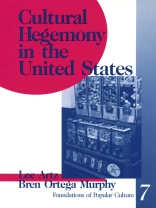Popular usage equates hegemony with dominance–a meaning far from Antonio Gramsci′s original concept where hegemony appears as a contested culture that meets the minimum needs of the majority while serving the interests of the dominant class.
This text is the first to present cultural hegemony in its original form–as a process of consent, resistance, and coercion. Hegemony is illustrated with examples from American history and contemporary culture, including practices that represent race, gender, and class in everyday life.
U.S. cultural hegemony depends in part on how well media, government, and other dominant institutions popularize beliefs and organize practices that promote individualism and consumerism. Corporate dominance and market values reign only through the consent of the majority, which, for the time being – finds material, political, and cultural benefit from existing social relations. As deep social contradictions undermine brittle hegemonic relations, the subordinate majority – including blacks, women, and workers will seek a new cultural hegemony that overcomes race, gender, and class inequality.
Tabla de materias
Introduction
Power through Consent
Cultural Hegemony and Racism
Hegemony and Gender
Breakthroughs and Entrenchment
Class Contradictions and Antagonisms
Prospect for Challenge and Change
Sobre el autor
Bren Ortega Murphy is a Professor at Loyola University Chicago where she holds a joint appointment in the School of Communication and the College of Arts & Sciences [Women′s Studies/Gender Studies]. Her areas of teaching and research include gender representation in popular culture, communication ethics, communication and service learning, and feminist theory. Her latest work is a feature length documentary, A Question of Habit. She has served in numerous leadership roles at Loyola, including Chair of Faculty Council, Chair of Communication Studies and Director of Women′s Studies. She was one of the first recipients of Loyola′s highest teaching award, the Sujack Award for Teaching Excellence. Dr. Murphy has also worked in the corporate sector, consulting and training throughout North America and Western Europe on matters of effective communication, strategic planning, and gender interaction.












